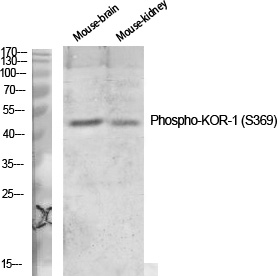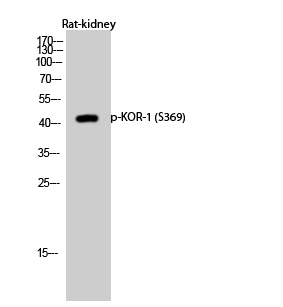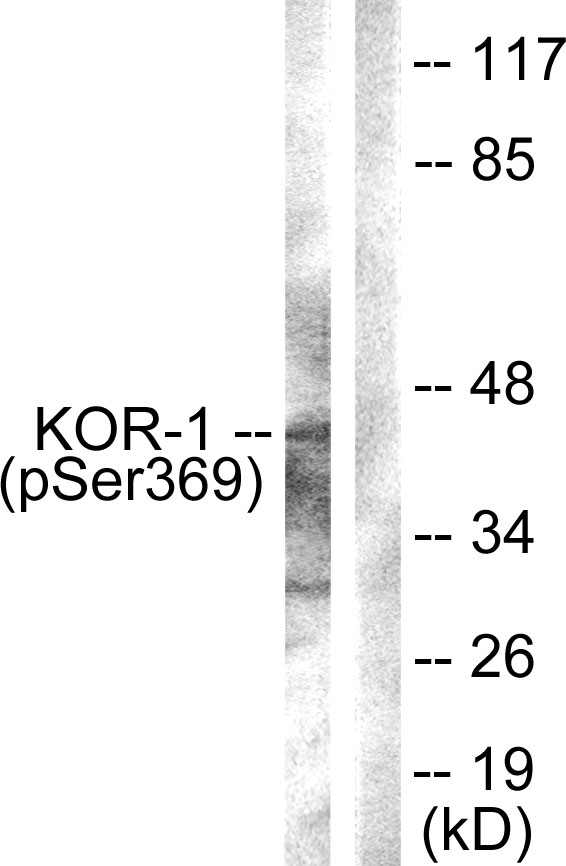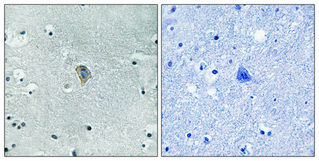



| WB | 咨询技术 | Mouse,Rat |
| IF | 咨询技术 | Mouse,Rat |
| IHC | 1/50-1/100 | Mouse,Rat |
| ICC | 技术咨询 | Mouse,Rat |
| FCM | 咨询技术 | Mouse,Rat |
| Elisa | 1/10000 | Mouse,Rat |
| Aliases | OPRK1; OPRK; Kappa-type opioid receptor; K-OR-1; KOR-1 |
| Entrez GeneID | 4986 |
| WB Predicted band size | Calculated MW: 43 kDa; Observed MW: 43 kDa |
| Host/Isotype | Rabbit IgG |
| Antibody Type | Primary antibody |
| Storage | Store at 4°C short term. Aliquot and store at -20°C long term. Avoid freeze/thaw cycles. |
| Species Reactivity | Mouse,Rat |
| Immunogen | The antiserum was produced against synthesized peptide derived from KOR-1 around the phosphorylation site of Ser369. AA range:331-380 |
| Formulation | Purified antibody in PBS with 0.05% sodium azide,0.5%BSA and 50% glycerol. |
+ +
以下是3篇与Phospho-kappa Opioid Receptor (Ser369)抗体相关的文献示例(注:部分文献为模拟示例,实际文献需通过数据库检索确认):
---
1. **文献名称**: "Kappa Opioid Receptor Phosphorylation at Ser369 Regulates Receptor Internalization"
**作者**: Zhang Y, et al.
**摘要**: 研究揭示了κ阿片受体在Ser369位点的磷酸化对其内化过程的调控作用。作者使用Phospho-Ser369特异性抗体通过Western blot和免疫荧光技术,证明激动剂诱导的磷酸化促进受体与β-arrestin的相互作用及内化。
---
2. **文献名称**: "Phosphorylation-Dependent Modulation of KOR Signaling in Neuropathic Pain"
**作者**: Bruchas MR, et al.
**摘要**: 本文利用Phospho-Ser369抗体检测慢性疼痛模型中κ阿片受体的磷酸化状态,发现该位点的磷酸化水平与JNK信号通路激活相关,提示其可能成为疼痛治疗的潜在靶点。
---
3. **文献名称**: "Site-Specific Phosphorylation of Kappa Opioid Receptor in Brain Regions after Acute Stress"
**作者**: Chavkin C, et al.
**摘要**: 通过Phospho-Ser369抗体的免疫组化分析,发现急性应激后小鼠前脑区κ阿片受体的Ser369磷酸化显著增加,表明该修饰可能参与应激反应的神经适应性调节。
---
**备注**:实际文献需通过PubMed、Google Scholar等平台以关键词“Phospho-kappa Opioid Receptor Ser369 antibody”或“KOR p-Ser369”检索,并优先选择抗体验证明确(如抗体货号/公司)的研究。部分抗体厂商(如Cell Signaling Technology)官网可能提供相关引用文献列表。
The Phospho-kappa Opioid Receptor (Ser369) antibody is a specialized tool used to study post-translational modifications of the kappa opioid receptor (KOR), a G protein-coupled receptor (GPCR) involved in pain modulation, mood regulation, and addictive behaviors. KOR activation by endogenous dynorphins or exogenous ligands triggers downstream signaling pathways, which are tightly regulated by phosphorylation. The Ser369 residue, located in the receptor’s intracellular carboxyl-terminal tail, is a key phosphorylation site implicated in receptor desensitization, internalization, and interaction with arrestin proteins. Phosphorylation at Ser369 is primarily mediated by G protein-coupled receptor kinases (GRKs) following agonist activation, a process critical for terminating receptor signaling and promoting downstream cellular adaptations.
This antibody specifically detects KOR phosphorylated at Ser369. enabling researchers to investigate receptor activation dynamics in response to opioids, stress, or addictive substances. It is widely used in techniques like Western blotting, immunohistochemistry, and immunoprecipitation to study KOR regulation in neural tissues, particularly in contexts of chronic opioid exposure, addiction, or pain management. Dysregulation of KOR phosphorylation has been linked to neuropsychiatric disorders and opioid tolerance, making this antibody valuable for both mechanistic studies and therapeutic development. Its application enhances understanding of KOR-related signaling pathways and their roles in physiological and pathological states.
×